European elections: Alternative history of UK politics
- Published
1979 - Conservative landslide
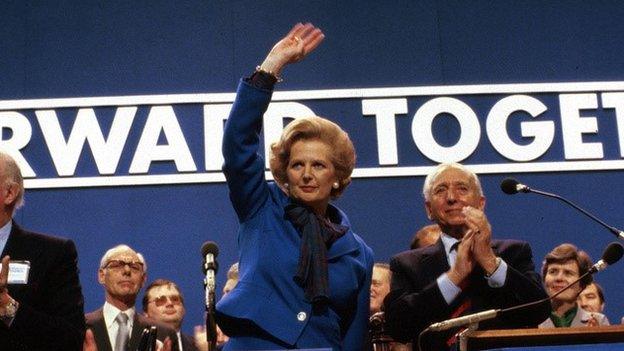
Margaret Thatcher's Conservatives swept all before them in the first ever direct elections to the European Parliament, gaining a massive 48.4% of the vote in the UK and 60 of the 78 available seats. The historic poll took place less than a month after Thatcher's far less emphatic general election victory, but with rain bucketing down across much of Britain, and voters weary of electioneering, just 30% bothered to cast a ballot - half the average turnout across the rest of the European Economic Community, as the EU was then known.
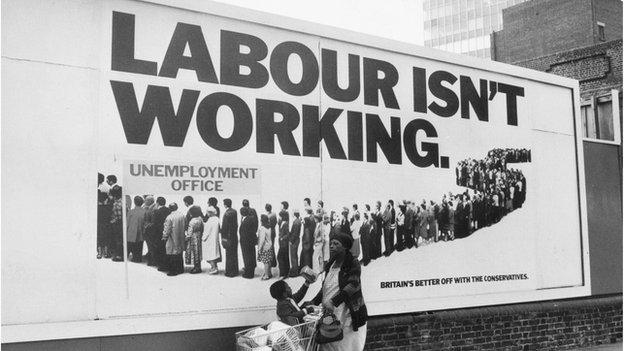
The European Parliament had existed in some form since the 1950s, with its members chosen by national governments. The EEC eventually caved in to calls for greater democratic accountability in the mid-1970s, but plans for an election in 1978 were scuppered by James Callaghan's Labour government, which could not decide on a voting system. In the end it opted for first-past-the-post, as at general elections, with 81 single member constituencies across Britain. Northern Ireland used the Single Transferable Vote system while the EEC's eight other member states all used some form of proportional representation.
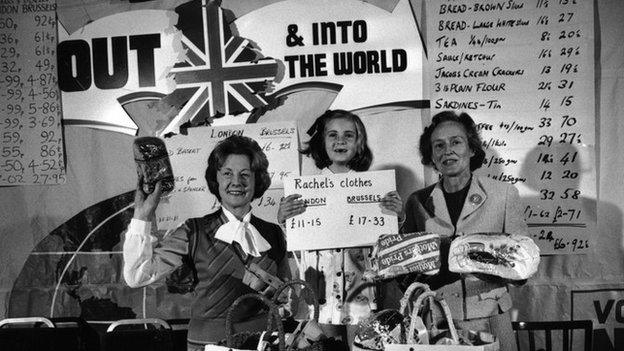
One result of this was that the Liberal Party had no representation in the European Parliament, despite gaining 12.6% of the vote. The SNP, with one seat, was the only other British party to get a look in. The Tories were a staunchly pro-European force in those days, while Labour was increasingly dominated by left-wingers who wanted Britain out. Former cabinet minister Geoffrey Rippon, chief negotiator for Britain's entry into the Common Market, was the Conservative group leader in the new Parliament. Stanley Johnson, father of London Mayor Boris, was among the new Tory MEPs, as was Bill Newton-Dunn, father of The Sun's political editor Tom Newton-Dunn, who later crossed the floor to join the Liberal Democrats and is the only British MEP from the 1979 intake to still sit in the Parliament. Fiery eurosceptic and scourge of the Common Agricultural Policy Barbara Castle - pictured above in 1974 - led Labour's 17 new MEPs.

1984 - Kinnock's first test
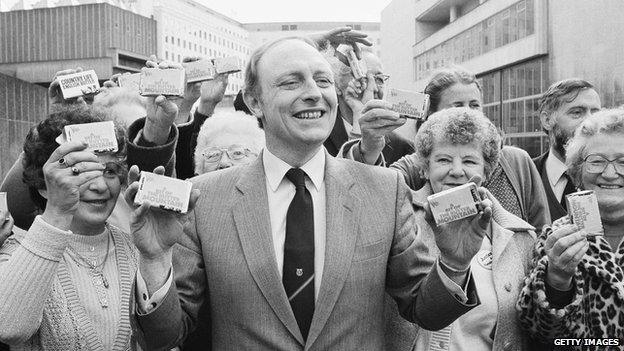
Britain was in the grip of the miners' strike when it went to the European polls in the summer of 1984. It was a hugely important election for new Labour leader Neil Kinnock, pictured here in a protest against the EEC butter mountain, who was battling to rebuild the party after its humiliating general election defeat a year earlier under Michael Foot. Labour gained a respectable 34.7% vote share and took 15 seats from the Conservatives, who comfortably topped the poll. But, more importantly for Kinnock, the SDP-Liberal Alliance, which had come within 2% of overtaking Labour at the general election, slumped to 19% of the vote and, thanks to first-past-the-post voting, got no MEPs.

1989 - Labour tops the poll
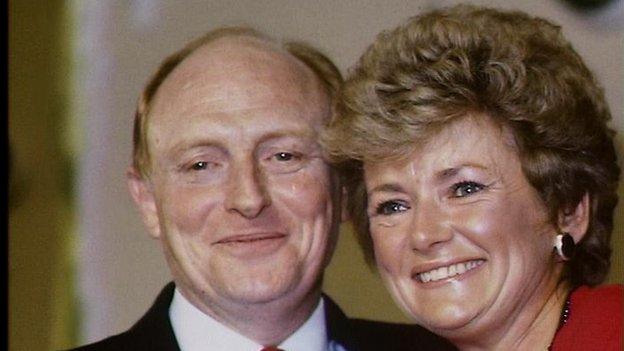
A landmark election for Labour, which had been transformed into a pro-European force under Neil Kinnock, but was reeling from a hefty defeat at the 1987 general election. The party polled more than the Conservatives for the first time in a national election since 1974, with 39% of the vote. However, it proved to be a false dawn for Kinnock, pictured here with wife and future Labour MEP Glenys, who would go on to lose to John Major in 1992. The Green Party achieved a stunning breakthrough on the back of public concern about climate change, collecting more than two million votes, or 15% of the total. It had only secured 70,853 votes in 1984 as The Ecology Party - but thanks to the voting system the Greens did not gain a single MEP in 1989. It was a good year for the SNP, which doubled its vote.

1994 - Enter UKIP, more Labour joy
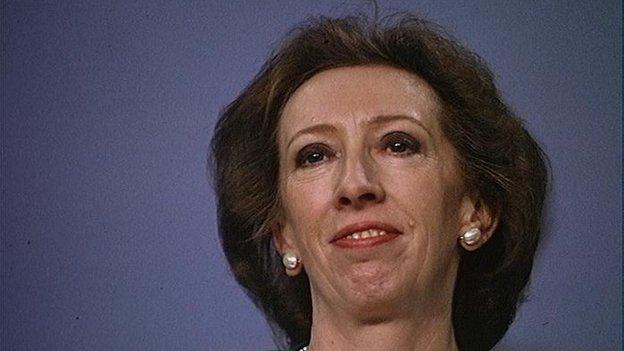
Hardly anyone noticed the debut of the fledgling UK Independence Party, which collected just 150,251 votes - a 1% share. The headlines were grabbed instead by the drubbing of Tory leader John Major at the hands of Labour, under the interim leadership of Margaret Beckett, following the sudden death of John Smith the previous month. The Conservatives lost 14 seats and slumped to 28% of the vote, to Labour's 44%. The Liberal Democrats finally managed to gain representation in Brussels, collecting a 17% share of the vote and two MEPs. They might have had three if Richard Huggett, standing as a "Literal Democrat", had not gained over 10,000 votes in the Devon and East Plymouth constituency. The Greens failed to capitalise on their 1989 surge, losing 78% of their vote.

1999 - Hague's finest hour
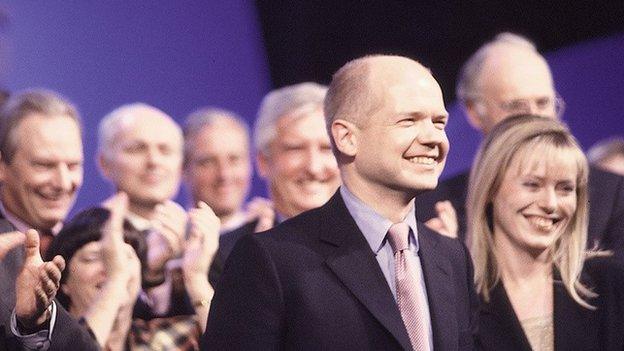
William Hague pulled a remarkable result out of the bag in 1999, saving his floundering leadership of the Tory Party and suggesting that he might even be in with a chance of beating Tony Blair. Labour slumped to 26% of the vote, to the Tories' 34%. In retrospect, it is clear Hague's anti-euro message struck a chord with voters, rather than the man himself. This was also the year that the anti-EU UK Independence Party gained its first significant representation, with Nigel Farage among its three new MEPs. UKIP was helped by the introduction of proportional representation, which also meant the Greens gained their first two MEPs, including future Green MP Caroline Lucas. Turnout was a woeful 23% - but European elections in the UK would never be the same again.

2004 - Kilroy was here
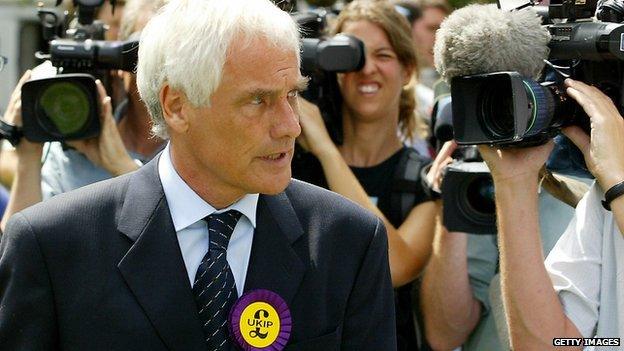
Signing up TV personality and former Labour MP Robert Kilroy-Silk - fresh from being sacked by the BBC for making controversial remarks about Arabs - turned out to be a masterstroke for UKIP (in the short-term, at least). The party went from three MEPs to 12 on the back of the publicity it generated. Michael Howard's Conservatives topped the poll, getting 4.1% more than Labour, which was suffering a public backlash against the Iraq war. Mr Howard could not convert this into a victory over Tony Blair in the following year's general election, however. Mr Kilroy-Silk attempted to take over UKIP before stomping off to form his own party, Veritas. But the writing was on the wall for the traditional mainstream parties in British politics. The smaller parties were on the march.

2009 - Brown meltdown
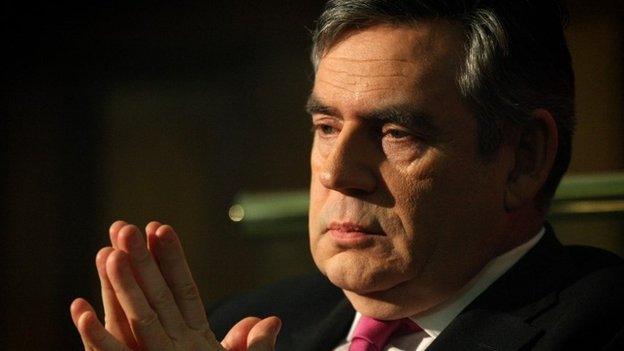
The year Gordon Brown came face to face with the scale of Labour's unpopularity under his leadership. The party suffered the indignity of being beaten by into third place by UKIP, which won 16.6% of the vote to Labour's 15.8%. The two parties had 13 MEPs each. The Conservatives, with 27.9% and 25 MEPs, won by a country mile in an another European election result that did not prove an accurate guide to the next general election. It was the first year the SNP had won the biggest share of a Euro poll in Scotland - and the first time since 1918 that Labour had failed to come first in Wales. The collapse of Labour's vote in its traditional northern English heartlands opened the door to the British National Party, which gained two MEPs in an electoral breakthrough that sent a chill through the political establishment.
